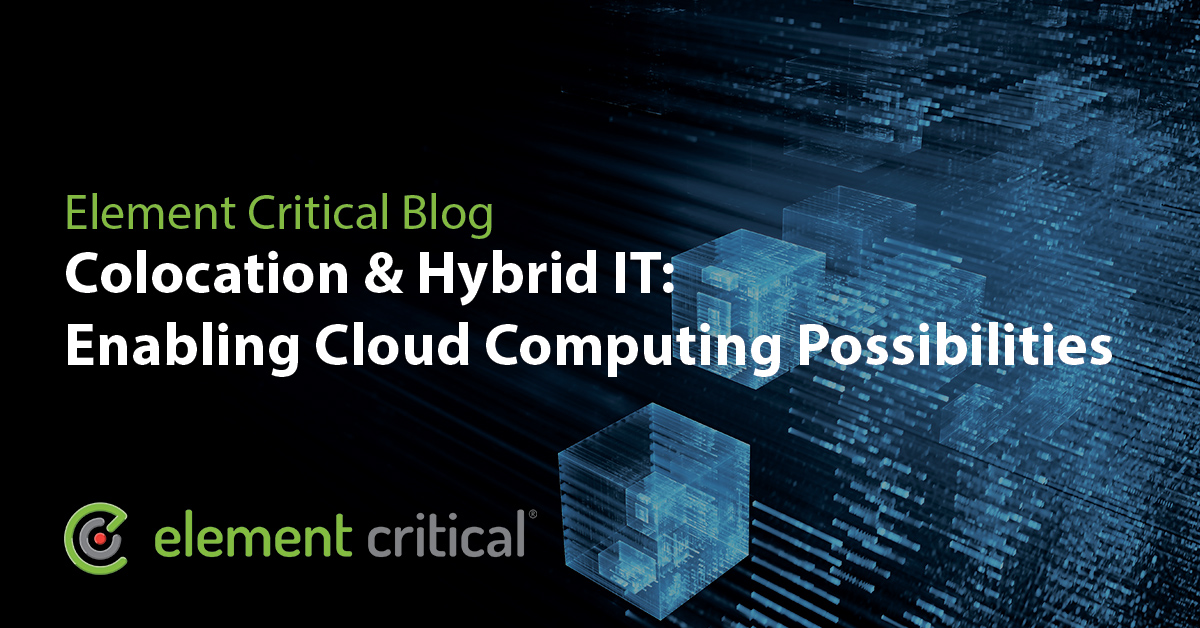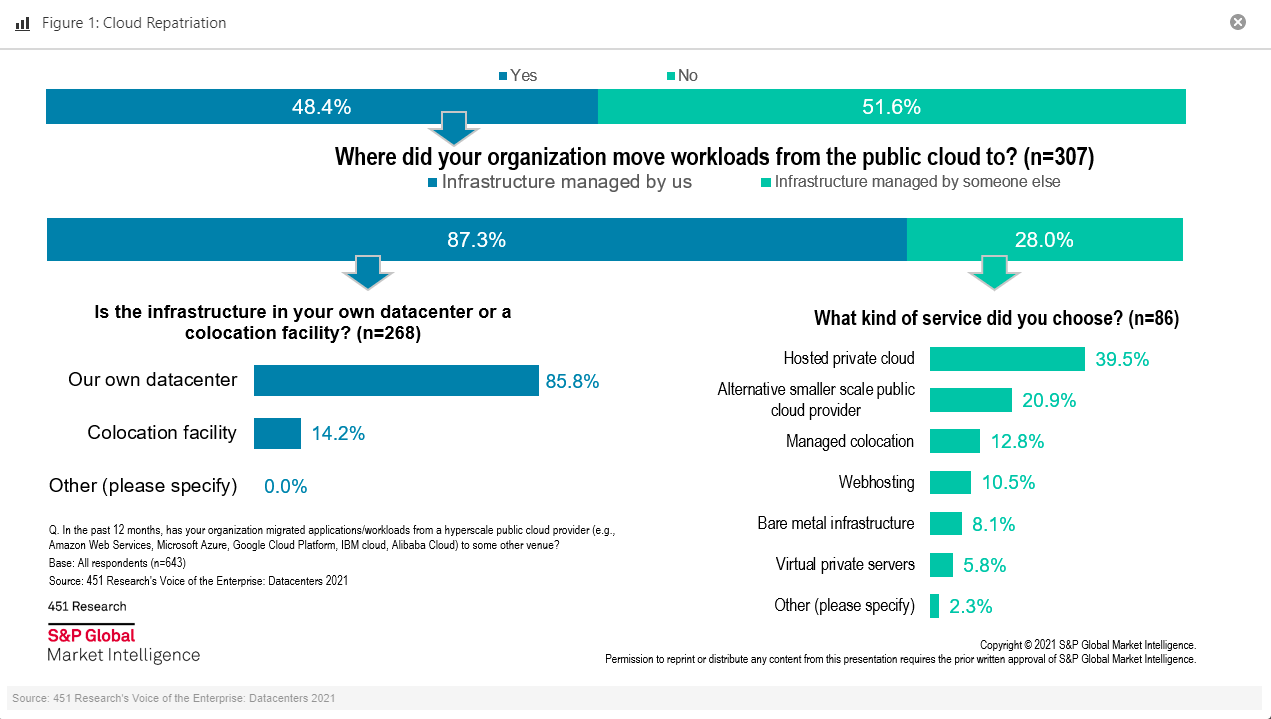Colocation & Hybrid IT: Enabling Cloud Computing Possibilities

Whether an IT team needs to stand up a new private cloud environment or modify existing cloud architecture, technology leaders don’t have to choose between only private or only public infrastructure. In a world where businesses must advance with the pace of technology and deploy IT environments that meet a variety of requirements, a hybrid approach to infrastructure is emerging as the best-of-all-worlds solution.
A hybrid infrastructure or hybrid cloud refers to an IT infrastructure design and environment made up of a mix of on-prem data centers, colocation data centers, public clouds, and private cloud environments.
The growing popularity of the Hybrid IT model allows companies to deploy operating systems and applications across these varied environments, prioritizing the most optimal solutions based upon what each environment offers, rather than having an all-or-nothing approach to IT infrastructure. It is rare for businesses, particularly ones that have operated for some time, to exist entirely in a data center, on-site, or only in the cloud. Put simply, companies can embrace the flexibility of the cloud while maintaining control over their resources in colocation with a wide array of connected services.
Benefits of a Hybrid IT Infrastructure
Businesses of all sizes can take advantage of the benefits a hybrid IT architecture can achieve:
- Increase agility
- Minimize vendor lock-in
- Scale services with access to modern applications
- Ensure operational control and governance
- Enable better disaster recovery solutions
- Increase ability to customize every aspect of your company IT
- Maintain control and security over critical operations
- Save money paying only for the public cloud when necessary
- Leverage best-in-breed software (SaaS) solutions
The Composition of a Hybrid Infrastructure
The hybrid infrastructure consists of cloud-based and physical infrastructure to ensure the most optimal workload performance across a distributed IT platform. Since streamlining a hybrid cloud begins in the data center, let’s look at each distinctive environment that comprises the Hybrid model.
On-Premise Data Center – ‘On-prem’ refers to private data centers managed by a company at their own facility. Servers managed fully in-house means the business is responsible for creating and maintaining optimal power, cooling, and network services. With full control over their data, companies can control valuable proprietary assets and adhere to compliance regulations. However, keeping infrastructure on-site can have some high-impact risks worth consideration.
Colocation Data Center – With colocation, companies share the cost of power, cooling, network, and data center space with other tenants. Far less expensive than building a data center or maintaining one on-site, companies can leverage the optimal environment and purpose-built redundancy without shouldering the entire cost burden. Colocation data centers offer greater reliability and protection from outages than on-premises environments and cloud environments. They also host a suite of network providers in carrier-neutral meet-me rooms to match customer’s insatiable requirements for low latency and connectivity solutions – difficult to achieve with on-prem data centers. IT teams can fully customize deployments, ensure security protocols and control the environment directly.
Public Cloud – The main difference between the public cloud and colocation resides in storing and managing the data. Cloud environments offer virtual servers instead of an organization providing its own equipment. The cloud provider manages, stores, and services the data center environment, so the customer doesn’t have to be responsible for setting up these elements. This turns the operational expense of running a data center into a capital expense, in addition to adding agility to scale services on-demand. However, the additional costs for each data transfer in and out of the cloud environment can grow exponentially – more data means expanding costs. The public cloud environment also sacrifices much of the control and security but provides a low cost of entry to get started.
Private Cloud – Also known as a corporate or internal cloud, this cloud computing environment includes owned hardware and software resources accessible only by the dedicated customer. Businesses have direct access to the data center where their data is stored. Private clouds offer flexibility, scalability, and ease of use with complete visibility over security and control over access. Customers have the freedom to customize resources in any way the business sees fit. These environments can be built and hosted in a colocation data center resulting in a hybrid cloud environment that is connected to the companies IT environments in the cloud or other data center locations. Private clouds are ideal for meeting compliance requirements and for workloads related to confidential data, intellectual property, personally identifiable information, medical records, or other sensitive data.
Hybrid Cloud – A combination of multi-cloud environments and physical data center space integrates public and private infrastructure, no matter where they are hosted. Customers can deploy the optimal cloud or colocation environment to work best for each individual application and workload. To make the best use of cloud computing, enterprises rely on technology and orchestration tools to move workloads seamlessly across the distributed environments to meet compliance needs, performance requirements and reduce costs. This creates an idealized division of labor methodology. Enterprises can employ the best-of-both world’s approach – keeping sensitive applications or data in a colocation data center while using public cloud and Software-as-a-Service applications.
The Movement Toward Multi-faceted IT Architectures
As enterprise businesses continue to scale most organizations are no longer looking for a single all-encompassing solution when it comes to their IT and data center needs. Whether they require the flexibility and agility of spinning up a cloud environment without the downpayment for equipment, or whether they prioritize the operational excellence and security benefits that a private infrastructure in a colocation data center offers, one thing is growing more certain. IT real estate is gravitating toward what 451 Research calls the ‘best execution venue.’
While many businesses raced to the cloud during Covid and previous years, intense cost pressures and compliance challenges continue to push these companies to repatriate their cloud workloads into a colocation environment that can integrate with and support their hybrid strategies. 451 Research conducted its Voice of the Enterprise: Datacenters 2021 survey in June and July this year, revealing 48% of respondents transitioned workloads or applications away from the public cloud providers (Amazon Web Services, Microsoft Azure, Google Cloud Platform) to some other venue in the past 12 months.

There are many reasons why this year showed a shift from the public cloud. The top factor behind moving applications out of the cloud was unsanctioned use of the public cloud (25% of respondents), information security concerns represented the second largest segment of those surveyed (23%) and application lifecycle considerations earned third place (22%).
Ultimately public cloud and on-prem/colocation IT will coexist given that 57% of businesses point their IT strategy toward hybrid environments. Furthermore, hybrid architectures built within colocated infrastructures provide easy integration with cloud interconnects and dramatically improve performance in the environments that require data exchanges between the public cloud and the data center.
Explore A No Compromises Partnership With Element Critical Colocation
Now that you better understand the various platforms we would love to tell you more about our services that help customers stand up hybrid environments within our colocation data centers.
Having a reliable colocation partner for deploying allows businesses to reach their goals faster without breaking the bank or risking critical data. Our services help customers focus on their core business. Colocation can reduce the overall total cost of ownership for your environment – adding services that can be consumed in increments to coalesce with your business goals.
Our expert teams can also assist with technology and service enhancements such as business continuity and disaster recovery, cloud connectivity, data storage, and physical security. With a colocation provider businesses can purchase and implement what best suits your business as it evolves and changes, scaling in a way that homegrown data centers often struggle to achieve. Our service levels can be customized to meet your unique deployment requirements, delivering better levels of availability and uptime for your most business-critical applications.
Reach out to our experts to discuss the best-fit solutions for your company.
[email protected]
(571) 374-8022
